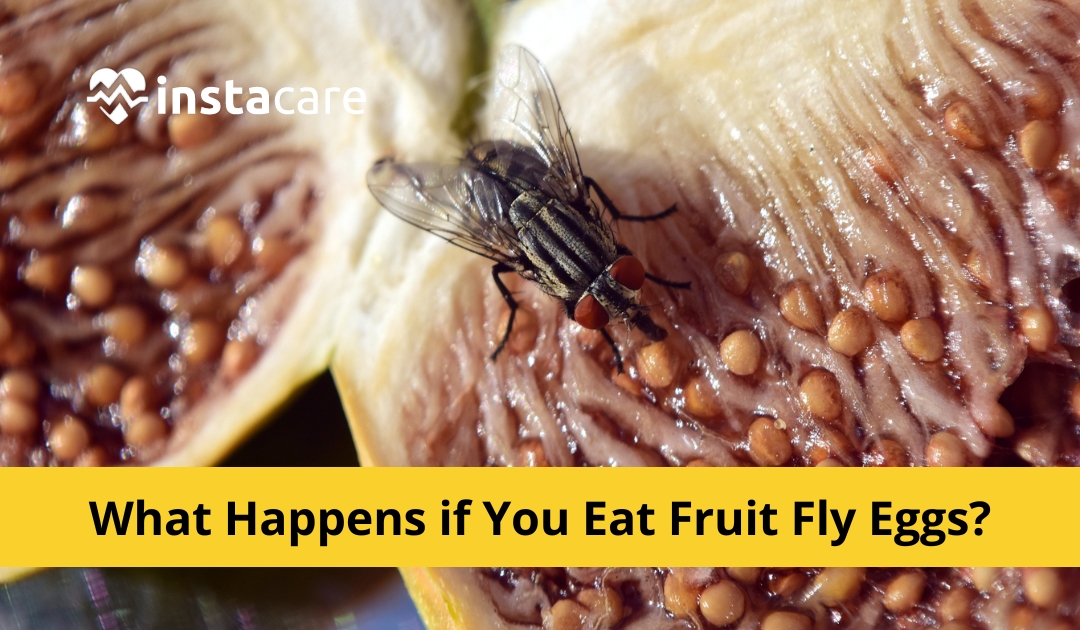It’s a common scenario - you are about to take a bite of your favorite fruit when suddenly, out of the corner of your eye, you spot something crawling on it. You peer closer and realizing it is an insect – specifically a fruit fly – you can't help but wonder: what if i ate one or two fruit fly eggs? From curiosity to concern, we're here to discuss exactly what happens when you eat these eggs so that men, women and anyone interested in their health can be informed and make wise choices around food safety.
What are fruit flies?
Fruit flies are a species of insect known scientifically as drosophila melanogaster. They breed rapidly, making them a major nuisance in kitchens, restaurants, grocery stores and greenhouses all around the world. The life-cycle of a fruit fly can be completed in as little as 8 days from egg to adult and they are attracted to overripe or rotting fruit and vegetables.
Though complications can arise from an infestation of fruit flies, for the most part they do not bite nor transmit any diseases that would require medical attention. As a result, eradication is mostly focused on prevention rather than reactive extermination once the flies have already set up shop.
Where do fruit flies come from?
Fruit flies, also referred to as drosophila, are incredibly common pests. They tend to appear in kitchens and other areas that have exposed food that is either rotting or uncovered. These insects can reproduce at an impressive rate of nearly 500 eggs per week and can spread quickly throughout a home if left unchecked.
In reality, these annoying pests are only prevalent because human provide them with the ideal breeding grounds: easy access to food sources, moisture and warmth as well as protection from predators. The best way to prevent fruit flies from appearing in your home is to take extra care when storing food and make sure it is properly covered and disposed of promptly whenever appropriate.
What is the lifecycle of fruit flies?
The lifecycle of fruit flies typically takes around eight to ten days, depending on environmental factors. Adult female fruit flies lay eggs within the skin of ripe or decaying fruit and vegetables, which hatches after a few days into maggots. Maggots feed and grow for several more days before pupating—they take on a pear-like shape and become encased in a protective cocoon while they transform into adult flies.
Once the adult stage is reached, they live for only one or two weeks; during this time, the cycle begins anew as the fruit fly finds new sources of food and mates with other flies of the same species. This cycle can quickly grow an infestation into an unmanageable size if left uncontrolled, making it important to maintain population control in homes and greenhouses.
Are fruit flies carriers of disease?
Fruit flies have long been suspected of being carriers of disease, as they often come into contact with contaminated food and other surfaces. Studies have found that they can certainly bring harmful bacteria and viruses into areas, but luckily, the impact is usually minimal.
They are able to spread germs relatively easily due to their airborne nature and small size, but the illnesses that these germs could cause in humans aren't generally very serious. So while fruit flies may be potential sources of infection, it's unlikely that they pose a serious health hazard.
View More: Is Packet Milk Healthy The Pros Cons Health Benefits Of Packet Milk
What happens if you eat maggots?
Eating maggots may have some unpleasant health consequences. Ingesting them can cause nausea, vomiting, and diarrhea, as well as abdominal pain and cramps. Bacterial diseases including salmonella are also a risk. It's important to seek medical attention if you believe you've eaten maggots, especially if you experience severe symptoms such as fever or tremors.
It's equally important to figure out how the maggots got into whatever food you consumed in the first place. If necessary, throw out all of it right away to minimize the risk of further contamination. Taking proper precautions when preparing food or buying groceries can help prevent maggot-related illness before it even begins.
What happens if you eat fruit fly eggs?
Eating fruit fly eggs is an experience no one should want to have. Although these tiny eggs may be difficult to keep track of, there are some possible side effects that should be watched for if any individual does ingest them. Symptoms such as cramps and stomach pain may accompany the digestive process following this ingestion.
In more serious cases, vomiting and nausea have been reported by some studies of fruit fly egg ingestion. It is also important to remember that consuming contaminated food, which could include fruit with the eggs present, can increase the risk of bacterial infections or even food poisoning. If someone experiences concerning symptoms after eating fruit fly eggs, it is wise to contact a medical professional for further advice.
1- Bacterial poisoning
Bacterial poisoning, also known as food poisoning, is an illness caused by consuming contaminated foods or beverages. It can cause an outbreak if a large batch of food or water has been contaminated. Symptoms usually start within six hours after eating contaminated food and include nausea, vomiting, abdominal cramps and fever. In extreme cases, bacterial poisoning can even result in death.
Of particular note is what happens when one consumes fruit fly eggs - these are often carriers of bacteria such as e. Coli which can easily lead to severe digestive problems if consumed and the resulting illness is classified as bacterial poisoning. Therefore it's important to be wary when consuming fruits and vegetables, or anything for that matter, that may be infested with fruit fly eggs to avoid the risk of contracting this potentially dangerous infection.
2- Myiasis
Myiasis is a rare medical condition in which flies lay eggs inside or on the surface of an animal's skin, often leading to infection, discomfort and sometimes even death. While the typical form occurs in moist areas of livestock such as cows, humans can also contract it if they come into contact with infected animals or contaminated material.
For example, what happens if you eat fruit fly eggs? Those who consume food contaminated with fly eggs may be at risk for larva migration, where larvae move through the body and feed off of tissue in organs. The result is a rare but immensely painful experience that requires immediate medical attention.
3- Allergic reactions
Allergic reactions occur when the body’s immune system overreacts and identifies something as a threat when it isn’t. Common reactions include the typical sneezing, coughing, and itching, but can also encompass more serious symptoms like swelling, hives, trouble breathing, and even anaphylaxis.
If you are allergic to something like nuts or pollen and consume or come into contact with it unintentionally—for instance what happens if you eat fruit fly eggs—you will most likely experience a mild reaction. However, if your allergy is severe enough then even small amounts can cause extreme responses that may require medical attention. Therefore, it is important to be aware of what you are consuming in order to reduce the risk of experiencing any type of allergic reaction.
What happens if you eat the fruit fly?
Eating a fruit fly can have serious consequences for your health. While the risk is relatively low, if you are already immunocompromised or have a weakened gut microbiome, there is a chance that consuming one of these tiny insects could make you quite ill.
The worst-case scenario is that you may experience an allergic reaction and develop symptoms such as wheezing, difficulty breathing and rashes - all of which require medical attention. Additionally, eating a fruit fly may also cause stomach upset and nausea, which can be uncomfortable but typically resolves on its own within 24 hours. In order to avoid any negative consequences from consuming a fruit fly, it’s best to keep them away from food products and out of your mouth altogether.
How to prevent fruit flies infestation?
Fruit flies can become a real nuisance in any home, but luckily, there are ways to prevent them from infesting or stop them from multiplying. To discourage fruit fly activity in the kitchen, make sure to keep food matters like fruits and vegetables stored in airtight containers whenever possible.
Empty your kitchen bin regularly and don’t leave out leftovers on countertops. It is also important to clean up spilled liquids quickly as these sweet liquids attract fruit flies. Additionally, you may want to consider using natural repellents like cloves and basil leaves; they have properties that repel these types of insects. With the right preventive measures and regular maintenance, you can prevent having an outbreak of fruit flies in your home.
Buy what you are sure you will eat
Making sure to only buy what you are sure you will eat is an important way to reduce food waste. Before heading to the store, consider your routine for the upcoming week, and think about which foods will go bad quickly that you likely wouldn't be able to finish in time. Don't feel tempted or swayed by sales or special offers; buy only what you are certain fits in your meal plan.
Also, pay attention to expiry dates; while some items can still be used past their expiration date without any serious health risks, some foods like milk should not be purchased after their expiration date has passed. Taking the time to plan ahead and only purchase items that fit into your lifestyle and regular meal plan is a great way to save money and reduce wasted food.
Clean the spills
Spills can be an eyesore and a major cause of fruit flies infestation. The best way to avoid this kind of problem is to clean spills immediately. Here are some guidelines for how to properly clean spills: 1) clean the area around the spilled material thoroughly - even very small amounts of residue can attract pests; 2) use plenty of soap and water; 3) rinse with a safe solution, such as vinegar and water; and 4) dry off the area with a cloth or absorbent paper towels. Following these steps, you can keep your home free from unsightly messes and pesky fruit flies infestation.
Turn off the lights
Turning off the lights is one of the easiest, most effective ways to prevent fruit fly infestations. By preventing light sources from attracting these pests, you can help keep them out of your home or business. Additionally, regularly cleaning and getting rid of potential food sources such as spilled drinks and rotting fruits can also help discourage these pesky critters.
Keep an eye on small cracks or crevices around windows and doors where fruit flies may enter to lay eggs or hide in cooler conditions. Lastly, making sure lids are sealed tightly on trash cans also helps minimize their ability to find sustenance and a place to live. Taking all these steps ensures that your spaces remain pest-free!
Wash your produce
Wash your produce regularly to keep it fresh and healthy! As part of this washing process, it’s important to run all produce under cold water, scrubbing away any dirt or residue. This is how you can prevent pests infestations such as fruit flies, moths, and aphids.
In addition to washing, also consider storing vegetables and fruits in airtight containers or wrapping them up before putting them in the refrigerator — this will make sure that no pest has a chance of getting inside. With these simple steps, you can keep your fruit and vegetable drawers always pest-free!
View More: How To Manifest Good Health Through Mindful Practices
To eat or not to eat
When eating and preparing food at home, it is important to consider how to prevent an infestation of fruit flies. Preventive measures such as regularly checking for ripe or spoiled fruits and vegetables in your refrigerator, and disposing of any decomposing plant material promptly is essential. Making sure that food is properly covered and lids are securely, and promptly wiping away spills can also help limit fruit fly access to potential breeding grounds.
Additionally, you can use store-bought traps or make a homemade trap with a jar and some apple cider vinegar, which should attract the flies. Staying on top of regular housecleaning will also help keep these pesky insects from multiplying throughout your kitchen!
Please book an appointment with the best Nutritionist in Lahore, Karachi, Islamabad, and all major cities of Pakistan through InstaCare, or call our helpline at 02137136090 to find a verified doctor for your disease.
Source: https://instacare.pk/blog/what-happens-if-you-eat-fruit-fly-eggs











